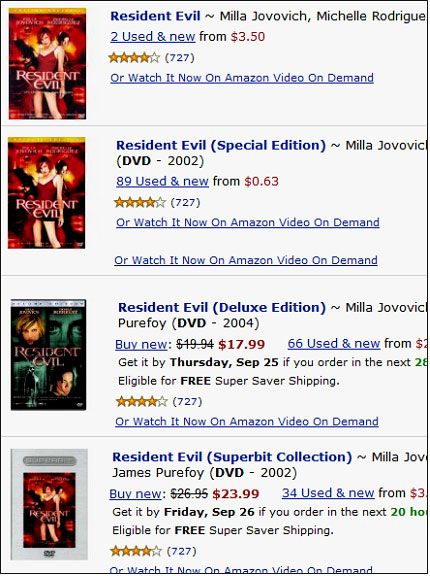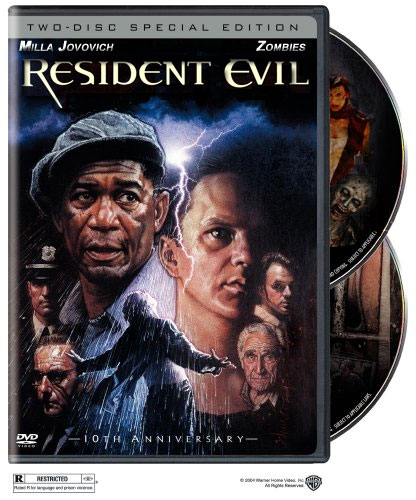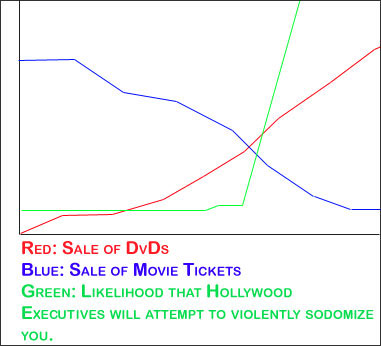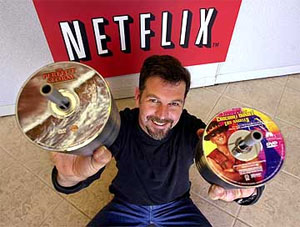5 Innovative Ways Hollywood Is Screwing You Over

Ah, Hollywood. Where the magic happens.
And by "magic," we usually mean overpriced crap homogenized to death by market studies. It turns out the dream factory that is the film industry is a business after all, and one with the kind of greed that puts Microsoft to shame.
Here are five of the new, innovative ways that they're screwing us over.
Double-Dipping DVDs

There are sometimes genuinely good reasons to issue a special edition DVD. The technology has improved, so there's no question DVDs released today often have image quality that was almost unthinkable when the format first appeared. So we're always happy for a cleaned-up edition, especially if the original was released back in the early days of the format when you considered it a special feature if you got a plastic DVD case instead of a cardboard one.

More often than not, though, studios will rerelease for any goddamn thing, often tacking on just enough "extras" to give them an excuse to slap on a new cover with a gold or silver bar at the top. A prime offender is Sony Home Video, which apparently can't be bothered to rerelease classic films like The Shop Around the Corner or His Girl Friday but are more than happy to crap out four different editions of Resident Evil.

This movie has been released on DVD more times than Citizen Kane.
Better Get Used to it...
As the profits continue to shift from theatrical to the home market, studios will keep finding reasons to do this. It doesn't help that we keep buying them, apparently on the wistful hope that a new picture on the cover will somehow make Resident Evil something other than terrible.

Just to rub it in our faces, a Miramax exec admitted they intentionally put out separate DVDs for each of the two Kill Bill volumes, saying:
Multiple bites. That Resident Evil "apple" must be a freakin' core by now.
Ads in Front of Movies

Television has had a long-standing unspoken agreement with the viewer: It shows you programs you like, and you in return ignore the ads that interrupt your enjoyment to go to the bathroom, flip around or--these days--fast-forward through them.
Advertisers have never been happy with that "ignore" part of the equation, and one day some enterprising ad executive looked at movie theater, saw how all of the viewers are basically forced to watch whatever comes on the screen with no option to change the channel, and came up with a truly evil idea.

"They're like a bunch of prisoners..."
They'd take the same ads you found too annoying to watch on TV, and project them in the theater! No changing the channel or fast-forwarding, and you often can't get up without fear of losing your seat. This would be the same seat you paid ten bucks for.
Theater chains were happy to take the money, figuring a little annoyance of their loyal customers was more than worth it to add another revenue stream.

Better Get Used to it...
And what a revenue stream it is. They've now got about 400 million reasons a year to keep running the ads, and that number is growing fast. Some markets have fifteen minutes worth of ads before the trailers (which are, you know, more ads).
The biggest chains (Regal Cinemas, Cinemark and AMC) have actually teamed up to form National CineMedia to maximize the sweet, sweet ad revenue. The only thing left is to stop the movie half way through so they can run more ads.

Now, in case you thought we were trying to make the theaters out to be the bad guys in this situation, one reason they got on board with this was due to...
Hollywood Squeezing Theaters for Every Dime

Hollywood has the major theater chains over a barrel, and they've been going all Deliverance on them for about two decades now. Pretty much every single thing you hate about the movie-going experience that doesn't involve some jerk on his cell phone can be attributed to this prison-bitch relationship dynamic.
This is why popcorn is like seven bucks a box. Yes ticket prices are ridiculous, but the movie theaters have to forward most of that money on to the studios.

A typical Hollywood executive.
The way it works is the studios have front-loaded deals, so that for the first weekend, up to 75% of box office has to be paid to the studio (Star Wars: Episode I infamously demanded 90% up front). Then each weekend thereafter it drops 10% (meaning the theater gets to keep more of the money as the movie plays).
You see why it's a terrible deal when you realize movies make most of their money in the first couple of weeks. So the studio cashes in during that early period when fans are seeing it based on the awesome trailer, and then the theaters are left with the crumbs when word of mouth informs everyone it's a turdburger.

Better Get Used to it...
As DVD sales have risen, theater attendance has sunk like a rock. So they have to keep afloat somehow, and that means inflated concession prices, the aforementioned commercials and those stupid slides before the movie starts. (See chart)

And through all of that, the studios still have all of the power in the relationship. Their product (that is, the movies) is the only thing that gets people into theaters. The chains don't have much choice but to sign the deal and go scraping for revenue elsewhere. They get screwed, so the theaters have no one left to screw but you, the customer, forming one big daisy-chain of screwing.
Which is exactly the sort of thing you'll never see on screen, thanks to...
The MPAA

By handing out movie ratings, the Motion Picture Association of America controls the entire movie industry. Seriously. You want an example of a dark conspiracy controlling a major American industry? This is it. Right here. The MPAA decides what you'll see in movie theater and video chains, and just as importantly, what you won't. They're probably watching you right now. Don't turn around.

They've got it set up so that if you're a filmmaker and want it to be shown on the vast majority of movie screens in America, you need an MPAA rating. The North American Theater Owners (no, seriously, they call themselves NATO), which consist of the biggest chain theaters in America, by and large will not show an unrated movie. Nor will they show a movie rated NC-17, which is why one romantic comedy after another is ruined by their refusal to show penetration.

DVD rental giant Blockbuster also doesn't do NC-17, and neither does Wal-Mart. So in short, the ratings system is entirely voluntary and you don't have to go through the process. Unless, you know, you were hoping people would get a chance to ever actually see your work.
This is why Hollywood contractually obligates filmmakers bring the movie in for at least an R rating. But luckily, the MPAA is honest and open with filmmakers about how their films are rated. Oh, wait, no. It's the exact opposite of that. The MPAA is a black box: you submit a film, it spits out a rating for that film, and that's it.

You can recut the film, but they won't tell you what to cut or why. So do you cut from the orgy, or the exploding skull scene? Or maybe trim two minutes off the sequence where a cow shits a leprechaun? All you can do is guess.
But you can appeal, right? Sure you can! The appeals board consists of...members of NATO, representatives of the clergy and studio heads. Good luck!
Better Get Used to it...
The MPAA isn't going anywhere. It's a fairly effective lobbying group, and people like the ratings system, even though it appears consumers largely ignore it (how many of you actually didn't see an R-rated movie until age 17?).
Will they loosen the restrictions of "adult" material? Well for now, movies are actually moving in the other direction as fast as possible. These days the challenge is all about watering movies down to the PG-13 sweet spot (see the Die Hard 4 fiasco), so forget about pushing the limits of the R vs NC-17 envelope. Your studio head is giving you two "fucks" and some side boob. And maybe a pencil through a dude's eye if you're lucky.
Video on Demand

As much money as Hollywood makes on DVD (and now, Bluray), there's one thing about it they still hate. Namely, the fact that you get to watch your copy over and over again without paying them again each time. It's not fair, dammit!
Even worse, you can loan your disc to a friend, without your friends paying to see it. Or, you can sell it back to some record store that deals in used DVDs. It's like highway robbery! You might as well leave these studio execs bleeding in an alley, you cold-hearted bastard!

"Before DVDs, I had four large bundles of money to juggle."
They hate it so much that they've been trying to devise a system that will lure the consumer away from, you know, actually owning movies and watching them when it's convenient, to a system where the consumer pays, every single time, to watch the movie, at Hollywood's convenience.
The first attempt was that venerable cable staple, pay-per-view. Remember when you were a kid, how PPV got "all the hot Hollywood movies FIRST"? Remember also how it cost about four times what it cost to rent a video? Remember how you laughed in their face?

Remember the laughing?
Then they tried to inflict DivX on humanity. DivX was a disc-based format which was supposed to rival DVD. The movies had no extras, didn't display in the proper aspect ratio, and literally expired after 48 hours. The idea that anyone would use DivX lasted just slightly longer.
The latest attempt is to put a squat plastic box on top of your TV that will feed you movies via download. So far, Vudu, Apple and Netflix have jumped into the fray with Blockbuster not far behind. Unsurprisingly, they're expensive, DRMed out the wazoo, don't cooperate with each other and have crappy selection. We're surprised the things don't self-destruct and blow up your house if you try to cancel.

Also unsurprisingly, they're all failing, with the possible exception of Netflix. At least their box doesn't make you pay for each movie, but lets you download however many you want for the same flat monthly fee you pay for the DVD subscriptions.
If that behavior seems less dick-like than what you'd expect from Hollywood, it's because Netflix doesn't really have a vested interest in the studios. Unlike, say, Apple, which has its ties to Disney via Steve Jobs, or Blockbuster, which has been owned by a movie studio, Viacom. So they don't have some guy in a suit in their office saying, "Come on, the little bastards will pay anything for our movies! Screw them harder! No, harder!"

Doesn't play by the rules.
Better Get Used to it...
The studios are still picturing a day when they can say goodbye to disc manufacturing and packaging costs once and for all (as well as having to share the profits with the retailers who sell them), hopefully replacing it with a model where you pay every time you watch a movie streamed directly from them over a digital signal.
After all, this is the era of broadband. Aren't customers ready to go to an all-download model for their movies?
Sure we are! We call it BitTorrent.

For even more proof that Hollywood is better than Japan at finding new and creative ways to screw people, check out 5 Ways Hollywood Tricks You Into Seeing Bad Movies. Or, read about how they plan on deflowering your childhood in 5 Upcoming Remakes of 80s Movies (That Must be Stopped). Or for an in-depth look at their favorite way to bone you, check out The 10 Most Shameless Product Placements in Movie History.